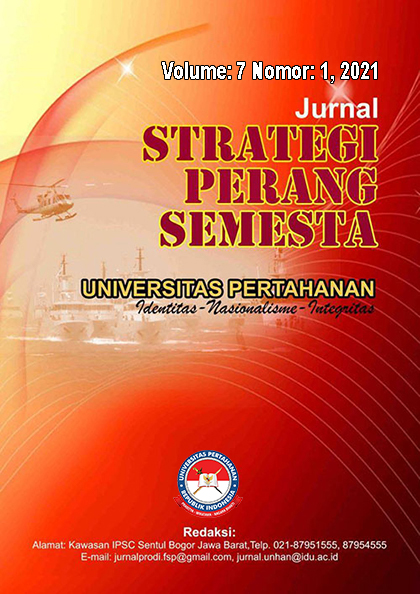STRATEGI PERANG SEMESTA MELALUI OPTIMALISASI NILAI-NILAI PANCASILA MENGHADAPI RADIKALISME PEGAWAI NEGERI SIPIL
DOI:
https://doi.org/10.56555/sps.v7i1.679Abstrak
The current dynamics of war development which tend to be asymmetric warfare, compel all strategic thinkers to face it. One of the asymmetric patterns of warfare after the second world war was religious radicalism. In previous periods, religious radicalism was promoted by groups from other countries to impose their interests through violent terror. To perpetuate its actions, this group popularizes its radical flow patterns throughout the world and all levels of society, including in the Republic of Indonesia. Many of its characteristics have been recognized by the government, which immediately conducts an evaluation to deal with them. The author observes this by examining Civilian Servants who are starting to be affected and the relationship patterns of their war strategies through optimizing Pancasila values in their training. The goal is that people understand the war that is happening and how to deal with radicalism through the inculcation of Pancasila values in training. The research method uses library research by studying various literature (books, references, previous research), information, data, and various documents. The end result has been implemented a universal war strategy through the formulation of Pancasila values in the basic training curriculum structure for Civilian Servant Candidates.Referensi
Adha, M. M. (2020). Kekuatan Nilai-nilai Pancasila dalam Membangun Kepribadian Masyarakat Indonesia. Al-Adabiya: Jurnal Kebudayaan Dan Keagamaan, 15(01), 121–138. https://doi.org/10.37680/adabiya.v15i01.319
Ansyar, M. (2017). Kurikulum: Hakikat, Fondasi, Desain dan Pengembangan (Pertama). Kencana.
Arif, Z. A. D. P. E. I. L. (2014). Pendidikan Bela Negara. UPN Veteran.
Basseng, Sammy Ferrijana, T. S. (2019). Wawasan Kebangsaan Dan Nilai-Nilai Bela Negara (Modul I Pelatihan Dasar Calon PNS Golongan II dan III). In Lembaga Administrasi Negara.
Briando, P. Y. P. B. (2019). Internalisasi Nilai-Nilai Pancasila dalam Penyusunan Kode Etik Aparatur Pengawas Internal Pemerintah (APIP). Jurnal Ilmiah Kebijakan Hukum, 13(2), 245. https://doi.org/10.30641/kebijakan.2019.v13.245-264
Clausewitz, C. Von. (1989). On war. In M. H. & P. Paret (Ed.), Princeton University Press (1989th ed.). Princeton University Press. http://books.google.com/books?id=-xsoV5ET9J8C&printsec=frontcover&dq=inauthor:EDMUND+HUSSERL+intitle:THE+CONFRONTATION+WITH+HEIDEGGER&cd=1&source=gbs_api
Hamzah, A. (2020). Metode Penelitian Kepustakaan Library Research (F. R. Akbar (ed.); Revisi). Literasi nusantara Abadi.
Idris, A. D. S. K. J. K. S. E. M. (2015). Nasionalisme Modul Pendidikan dan Pelatihan Prajabatan Golongan III. LAN RI.
Idris, I., Suwarno, Y., Purwana, B. H., Dendi, S., Imran, S., Nusa, B. S. P., & Sejati, T. (2019). Analisis Isu Kontemporer Modul Pelatihan Dasar Calon Pegawai Negeri Sipil Golongan II dan Golongan III. LAN RI.
Kemdikbud. (2016a). KBBI Daring: Habituasi. Kemdikbud.Go.Id. https://kbbi.kemdikbud.go.id/entri/habituasi
Kemdikbud. (2016b). KBBI Daring: Radikalisme. Kemdikbud.Go.Id. https://kbbi.kemdikbud.go.id/entri/radikalisme
Undang Undang Nomor 5 Tahun2014 tentang Aparatur Sipil Negara, 1689 (2014). https://doi.org/10.1017/CBO9781107415324.004
Kemhan RI. (2015). Buku putih. In Kementrian Pertahanan Republik Iindonesia.
Klaus Schwab. (2016). The Global Competitiveness Report. In World Economic Forum (Vol. 21, Issue 3). https://doi.org/10.1111/j.1467-9639.1999.tb00817.x
Latif, Y. (2020). Wawasan Pancasila: Bintang Penuntun untuk Pembudayaan (Komprehens). Mizan.
Lembaga Administrasi Negara. (2015). “Anti Korupsi” Modul Pendidikan dan Pelatihan Prajabatan Golongan I/II dan III. Lembaga Administrasi Negara, 1–122.
Peraturan LAN RI No. 1 Tahun 2021 tentang Pelatihan Dasar Calon Pegawai Negeri Sipil, 1 (2021).
Prabowo, L. T. J. (2009). Pokok-Pokok Pemikiran tentang Perang Semesta (Pertama). PPSN.
Riyanta, S. (2020). Menyikapi Radikalisme di Kalangan ASN. Indonews.Id. https://indonews.id/artikel/28205/Menyikapi-Radikalisme-di-Kalangan-ASN/
Suhanda. (2018). Diskursus Peningkatan Kompetensi dan Kode Etik ASN Melalui Program Pendidikan dan Pelatihan di Lingkungan Kementerian Pendidikan dan Kebudayaan. Jurnal Kediklatan, 3(2), 409–418.
Taylor, B. (2010). Religion, Radicalism, and Fantasy. History, 39(39), 102–112.
Unduhan
Diterbitkan
Terbitan
Bagian
Lisensi
Proposed Policy for Journals That Offer Open Access. Authors who publish with this journal agree to the following terms:
- Authors retain copyright and grant the journal right of first publication with the work simultaneously licensed under a Creative Commons Attribution License that allows others to share the work with an acknowledgment of the work's authorship and initial publication in this journal.
- Authors are able to enter into separate, additional contractual arrangements for the non-exclusive distribution of the journal's published version of the work (e.g., post it to an institutional repository or publish it in a book), with an acknowledgment of its initial publication in this journal.
- Authors are permitted and encouraged to post their work online (e.g., in institutional repositories or on their website) prior to and during the submission process, as it can lead to productive exchanges, as well as earlier and greater citation of published work (See The Effect of Open Access).
Proposed Policy for Journals That Offer Delayed Open Access. Authors who publish with this journal agree to the following terms:
- Authors retain copyright and grant the journal right of first publication, with the work [SPECIFY PERIOD OF TIME] after publication simultaneously licensed under a Creative Commons Attribution License that allows others to share the work with an acknowledgment of the work's authorship and initial publication in this journal.
- Authors are able to enter into separate, additional contractual arrangements for the non-exclusive distribution of the journal's published version of the work (e.g., post it to an institutional repository or publish it in a book), with an acknowledgment of its initial publication in this journal.

